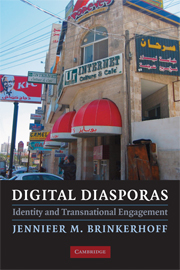Book contents
- Frontmatter
- Contents
- Tables and Figure
- Acknowledgments
- Digital Diasporas
- 1 Introduction
- 2 Diasporas, Identity, and Information Technology
- 3 Keeping the Dream Alive
- 4 Digital Diasporas as Cybercommunities
- 5 Digital Diasporas and Conflict Prevention
- 6 Policy Agendas, Human Rights, and National Sovereignty
- 7 Helping the Homeland
- 8 Digital Diasporas: A New Avenue for Peace and Prosperity?
- Appendix
- Acronyms
- Bibliography
- Index
6 - Policy Agendas, Human Rights, and National Sovereignty
Published online by Cambridge University Press: 05 June 2012
- Frontmatter
- Contents
- Tables and Figure
- Acknowledgments
- Digital Diasporas
- 1 Introduction
- 2 Diasporas, Identity, and Information Technology
- 3 Keeping the Dream Alive
- 4 Digital Diasporas as Cybercommunities
- 5 Digital Diasporas and Conflict Prevention
- 6 Policy Agendas, Human Rights, and National Sovereignty
- 7 Helping the Homeland
- 8 Digital Diasporas: A New Avenue for Peace and Prosperity?
- Appendix
- Acronyms
- Bibliography
- Index
Summary
When considering diasporas' political roles vis-à-vis the homeland state, policymakers, analysts, and homeland governments commonly fixate on diasporas' potential threat to state sovereignty and the potential security implications (for the nation, region, and, increasingly, globally). But diasporas may also support agendas consistent with liberal values, such as democracy and human rights, and these may be welcome to selected homeland constituents and the international community alike. Furthermore, diasporas may not threaten state sovereignty to the extent feared, and may even support it.
Digital diasporas assemble diasporans to consider issues surrounding human rights, assert their views on these, and debate policy options. This deliberation may occur exclusively in the digital world or more proactively, through political agendas informed and/or created by online discussions. This chapter analyzes two such cases. It revisits TibetBoard and explores its political debates, and it considers the case of the U.S. Copts Association and its physical world political agenda to improve the quality of life of Copts residing in Egypt. While much of the outside world does not consider Tibet a sovereign nation, the Tibetan identity and political community believes the Tibetan Government in exile is sovereign, and its subjects should not question its decisions. The religion and culture reinforce this deference. The U.S. Copts Association engages in the physical world in ways that may seem to threaten the Government of Egypt's sovereignty. I will argue the U.S. Copts Association may also reinforce it.
- Type
- Chapter
- Information
- Digital DiasporasIdentity and Transnational Engagement, pp. 149 - 170Publisher: Cambridge University PressPrint publication year: 2009

